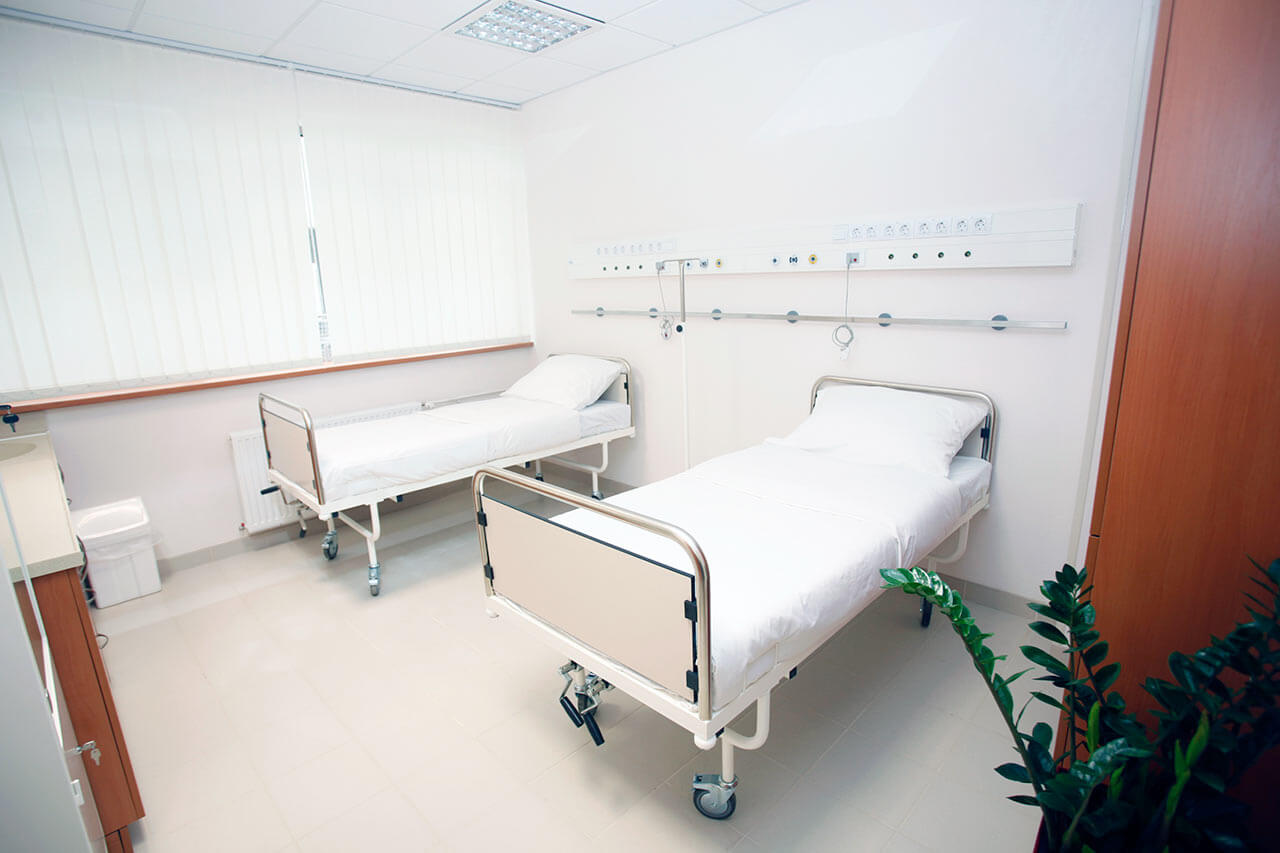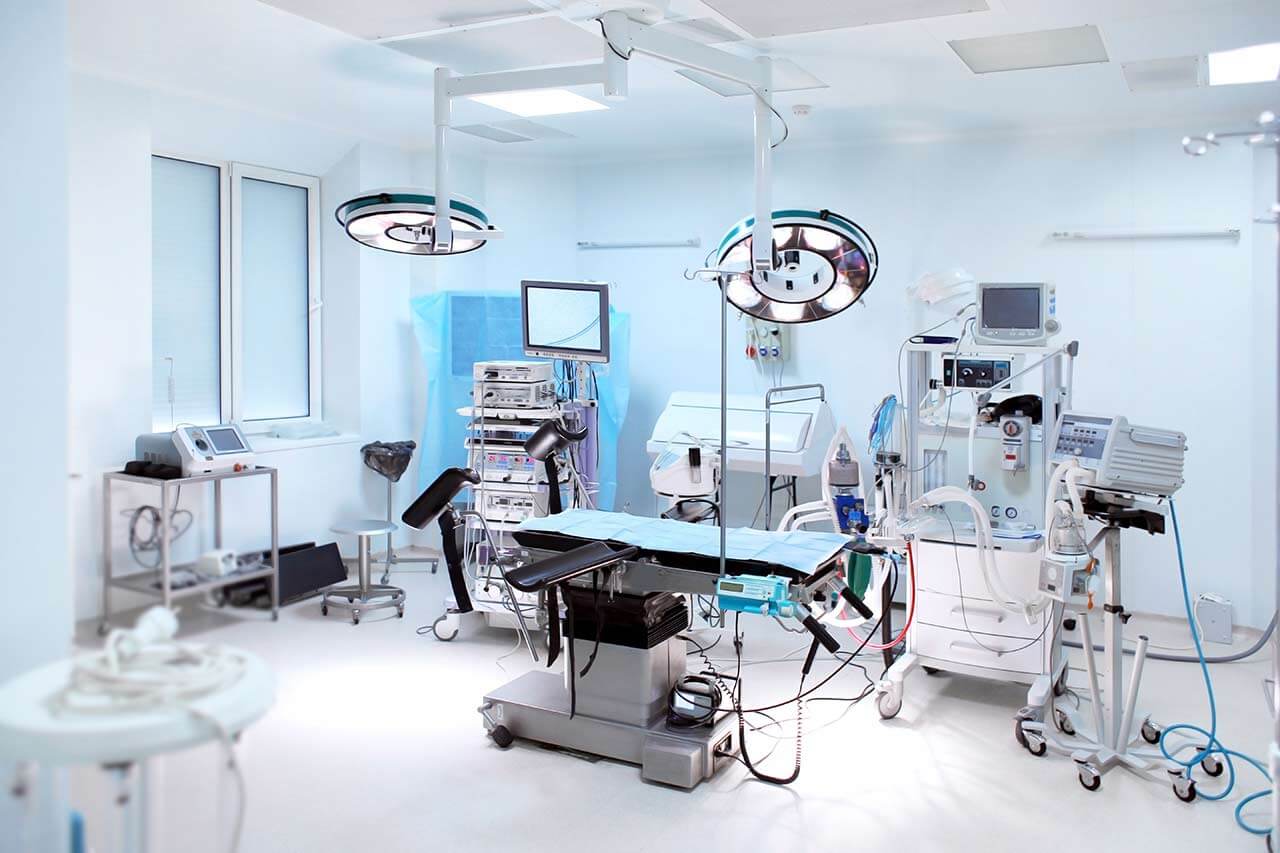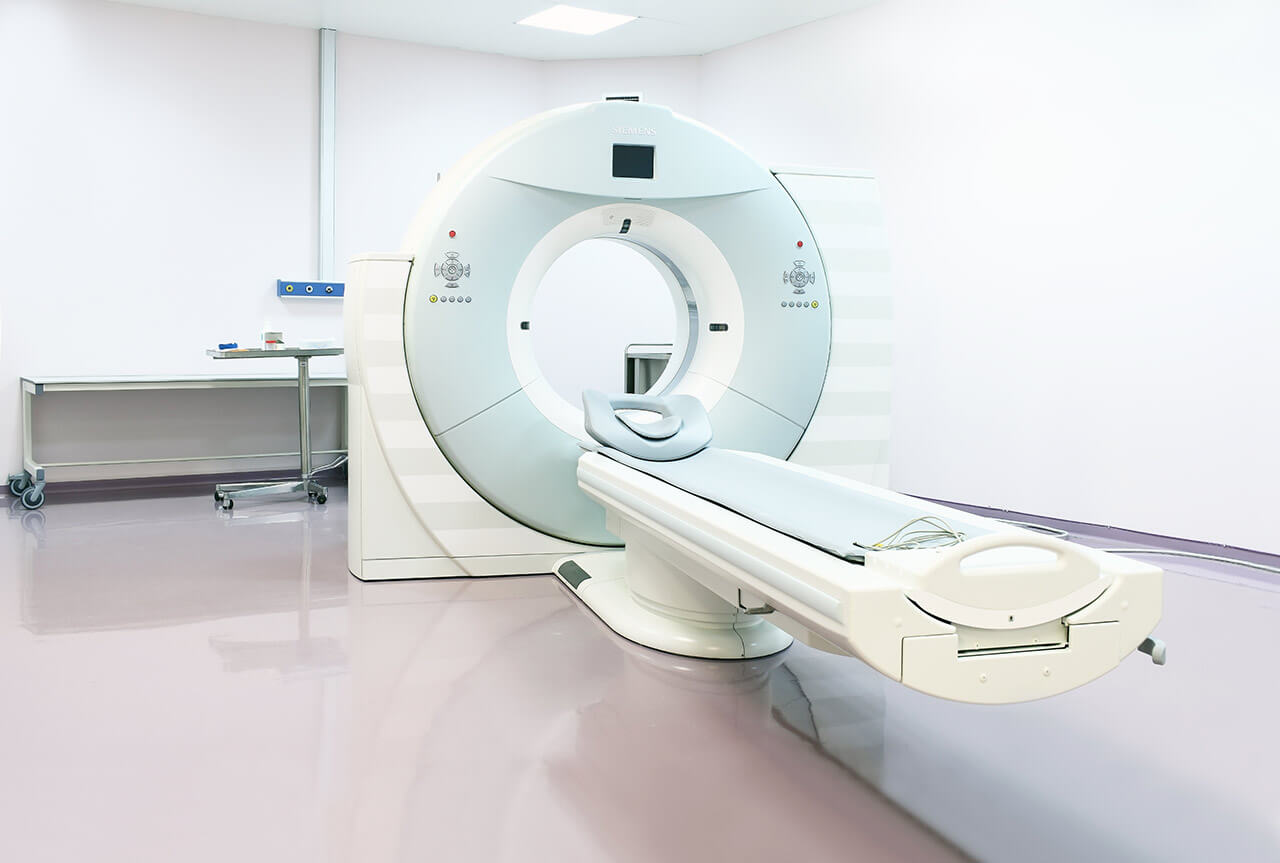
The program includes:
- Initial presentation in the clinic
- clinical history taking
- physical examination
- review of medical records
- laboratory tests:
- complete blood count
- general urine analysis
- biochemical analysis of blood
- TSH-basal, fT3, fT4
- indicators of inflammation (CRP, ESR)
- indicators blood coagulation
- abdominal ultrasound
- CT/MRI abdomen
- preoperative care
- surgical hernia plastic
examination of the remote tissues - symptomatic treatment
- control examinations
- the cost of essential medicines and materials
- nursing services
- nutrition recommendations
- full hospital accommodation
- explanation of future recommendations
Required documents
- Medical records
Service
You may also book:
 BookingHealth Price from:
BookingHealth Price from:
About the department
The Department of General and Abdominal Surgery, Hepatopancreatobiliary Surgery and Hernia Surgery at the Asklepios Hospital Barmbek Hamburg offers the full range of services in the areas of its specialization. The department's surgical team successfully performs interventions for diseases of the stomach, esophagus, small intestine, large intestine, rectum, pancreas, liver, gallbladder, and bile ducts. Patients with various types of hernias, including inguinal, umbilical, and incisional hernias, are also operated on here. It should be noted that the department also performs cytoreductive surgery with hyperthermic intraperitoneal chemotherapy (HIPEC), which is an advanced treatment method for peritoneal carcinomatosis. The specialists at the medical facility strive to provide patients with not only effective but also as sparing treatment as possible. That is why the use of minimally invasive surgical techniques is a priority. Such an approach to treatment practically eliminates surgical risks and reduces the duration of a hospital stay. The department has the status of an Expert Center for Liver and Pancreatic Surgery as well as a Competence Center for Upper Gastrointestinal Surgery, which is confirmed by the certification from the German Society for General and Visceral Surgery (DGAV). In addition, the medical facility regularly demonstrates high success rates in the surgical treatment of gastrointestinal cancers, which are confirmed by the certification from the German Cancer Society (DKG). The department is headed by Prof. Dr. med. Karl Jürgen Oldhafer.
In the field of general and abdominal surgery, special attention is paid to the treatment of patients with stomach and esophageal cancers. The key treatment method for these cancers is surgery. Each patient's clinical case is studied during a multidisciplinary tumor board with the participation of gastroenterologists, oncologists, radiation therapists, and radiologists. Such an approach allows doctors to develop the most effective treatment regimen based on specific diagnostic data, such as the type of tumor, its location, size, stage, and type, as well as the patient's general health condition and the presence or absence of comorbidities. Treatment tactics for esophageal cancer largely depend on the location of the malignancy. Tumors in the cervical section of the esophagus are extremely rare and are usually treated with chemoradiation therapy. When the tumor is located in the thoracic section of the esophagus, surgery is performed through a transabdominal or transthoracic approach, and in some cases, neoadjuvant chemoradiation therapy can be performed before surgery. As for stomach cancer, the department's specialists offer two main types of surgical treatment, namely subtotal (indicated for patients with small tumors) and total (indicated for patients with large tumors) gastrectomy. A significant proportion of stomach and esophageal surgical procedures are performed in the department using sparing, minimally invasive techniques. In addition, the department is one of the few in Germany where stomach and esophageal surgical interventions, including particularly complex ones, are actively practiced using the advanced da Vinci surgical system. Robot-assisted interventions are characterized by the highest precision, ensure minimal trauma rate and blood loss, and practically reduce complications to zero.
The department's surgical team is also deservedly proud of its successful experience in cytoreductive surgery followed by hyperthermic intraperitoneal chemotherapy (HIPEC) for the treatment of peritoneal carcinomatosis. This oncopathology is usually a complication of other abdominal cancers that have reached advanced stages. It is worth noting that not so long ago, patients with peritoneal carcinomatosis were considered hopeless, but the implementation of the HIPEC procedure into clinical practice allowed the doctors to significantly extend their life expectancy. HIPEC operations are performed by an experienced team of surgeons led by Dr. med. Michael Lipp, one of the most experienced colorectal surgeons in Germany specializing in HIPEC treatment. In March 2024, the department was certified as the Center of Excellence for HIPEC for Peritoneal Carcinomatosis by the German Society of General and Visceral Surgery (DGAV). Dr. Lipp and his team are among the pioneers in the use of this surgical technique. They have more than 10 years of successful clinical experience in this field. During this time, more than 150 HIPEC procedures have been performed, which is a very high rate not only in Germany but also in the international medical arena.
The essence of HIPEC treatment is as follows: cytoreductive surgery is performed, during which surgeons remove all cancer foci visible to the naked eye in the abdominal cavity, after which the abdominal cavity is rinsed for 60-90 minutes with a solution of chemotherapeutic agents heated to 41°C. HIPEC is characterized by high efficiency since chemotherapeutic agents do not enter the body through the blood vessels, as it happens with classical systemic chemotherapy, but are injected directly into the cancer focus, which contributes to the enhancement of the therapeutic effect. Administering a solution of chemotherapy drugs into the abdominal cavity also gives surgeons the opportunity to repeatedly increase their dosage without causing any serious side effects.
The department's team of hepatopancreatobiliary surgeons specializes in the treatment of diseases of the liver, pancreas, gallbladder, and biliary ducts. Surgeons excel in performing operations for benign liver diseases, including cysts, hemangiomas, adenomas, and focal nodular hyperplasia. The doctors use minimally traumatic surgical techniques whenever possible. The department also has vast experience in the treatment of liver cancer and liver metastases. In most cases, it is possible to perform surgical resection of a malignant tumor or liver metastases using minimally invasive techniques. In advanced stages of cancer, surgery may be contraindicated. In these cases, patients may undergo transarterial chemoembolization (TACE). This procedure is performed by interventional radiologists and involves blocking the blood vessels supplying the tumor, which leads to its destruction.
The department's range of surgical options includes the following:
- General and abdominal surgery
- Surgery for benign diseases
- Surgery for gastroesophageal reflux disease
- Surgery for diverticular disease
- Surgery for stomach ulcers
- Surgery for inflammatory bowel disease: Crohn's disease and ulcerative colitis
- Surgery for malignant diseases
- Surgery for stomach cancer
- Surgery for esophageal cancer
- Surgery for bowel cancer
- Surgery for colorectal cancer
- Surgery for gastrointestinal stromal tumors
- Cytoreductive surgery followed by hyperthermic intraperitoneal chemotherapy (HIPEC) for peritoneal carcinomatosis
- Surgery for benign diseases
- Hepatopancreatobiliary surgery
- Surgery for benign diseases
- Surgery for liver cysts
- Surgery for cirrhosis
- Surgery for liver hemangiomas
- Surgery for liver adenomas
- Surgery for focal nodular hyperplasia
- Surgery for cholecystolithiasis
- Surgery for choledocholithiasis
- Surgery for acute and chronic pancreatitis
- Surgery for benign pancreatic tumors
- Surgery for malignant diseases
- Surgery for hepatocellular carcinoma
- Surgery for liver metastases
- Surgeries for gallbladder cancer
- Surgery for bile duct cancer
- Surgery for pancreatic cancer
- Surgery for benign diseases
- Hernia surgery
- Surgery for inguinal hernias
- Surgery for umbilical hernias
- Surgery for incisional hernias
- Other medical services
Curriculum vitae
Higher Education and Professional Career
- 1978 - 1984 Medical studies, Georg August University of Goettingen, as well as Internship at the University of Illinois, USA.
- 1984 State Medical Examination, Georg August University of Goettingen.
- 1985 Thesis defense, Georg August University of Goettingen.
- 1984 Admission to medical practice.
- 1984 - 1985 Training in experimental pathology, Hannover Medical School.
- 1985 - 1986 Work in the Transplant Immunology Laboratory, Hannover Medical School.
- 1986 - 1992 Internship, Department of Surgery, Hannover Medical School.
- 1992 Surgeon, Hannover Medical School.
- 1993 Appointed as Emergency Medical Service Physician.
- 1993 Venia Legendi in Surgery, Hannover Medical School. Subject: "Ischemic and reperfusion injuries after liver transplant surgery".
- 1993 - 1998 Senior Physician, Department of Abdominal and Transplant Surgery, Hannover Medical School; Head of the Transplant Program, Hannover Medical School.
- 1998 Advanced training in Abdominal Surgery.
- 1998 Extraordinary Professorship.
- 1998 - 2002 Senior Physician, Department of General, Abdominal and Transplant Surgery.
- Head, Section of Cancer Surgery, University Hospital Essen.
- Since March 2002 Head Physician, Department of General and Abdominal Surgery, General Hospital in Celle, Academic Hospital of the Hannover Medical School.
- Since February 2007 Head Physician, Department of General Surgery, St. Joseph-Stift Hospital in Celle.
- Since July 2007 Head Physician, General Hospital in Celle.
- Head Physician, Department of General and Abdominal Surgery, Hepatopancreatobiliary Surgery and Hernia Surgery, Asklepios Hospital Barmbek Hamburg.
Awards and Prizes
- 1995 Award of the Year for the Best Transplant Research: "Assisted orthotopic liver transplant. A new therapeutic method for the treatment of acute liver failure", European Hepato-Pancreato-Biliary Association, Athens.
- 1997 Best Presentation Award. Subject: "Hyperthermic isolated liver perfusion (HILP) with tumor necrosis factor", experimental research, European Congress of the International Hepato-Pancreato-Biliary Association.
- 1999 Award for work on the subject: "Preoperative virtual planning of liver surgery using 3D liver models", Congress on Liver Tumor Surgery, Munich, University Hospital of Ludwig Maximilian University of Munich.
- Award for work on the subject: "Image processing system for preoperative planning of liver surgery", German Roentgen Society, Wiesbaden.
- 2004 Award for work on the subject: "Double rupture of the liver and spleen after minor trauma during treatment with Marcumar", Conference of the Society of North-West German Surgeons.
Photo of the doctor: (c) Asklepios Klinik Barmbek
About hospital
The Asklepios Hospital Barmbek Hamburg is an academic hospital of the University of Hamburg. The hospital was opened in 2005, and today it is one of the best and most modern medical centers in Europe. The priority areas of specialization of the medical facility are emergency medical care and comprehensive treatment of cancer, urologic diseases, gastrointestinal diseases, and pulmonary diseases, as well as abdominal surgery and thoracic surgery. The hospital provides patients with top-class medical services that meet international standards.
The hospital has 620 beds. More than 36,000 inpatients and about 74,000 outpatients are treated here every year. The patients' health is in the safe hands of a highly professional team of over 1,600 doctors and nursing staff.
The hospital offers high-quality diagnostic and therapeutic services and strictly follows current clinical protocols. The hospital boasts modern infrastructure and state-of-the-art medical equipment. The hospital is one of the few in Europe where patients are successfully operated on using the da Vinci surgical system. The hospital also houses well-equipped endoscopy rooms, cardiac catheterization laboratories, laser surgery rooms, and operating rooms for arthroscopic interventions. All these technical resources contribute to effective and, at the same time, minimally traumatic treatment.
It is worth noting that the hospital has vast experience in serving international patients. According to the Medical Travel Quality Alliance (MTQUA), the Asklepios Hospital Barmbek Hamburg ranks among the top three medical centers worldwide for medical tourism.
The medical center also holds the international DIN EN ISO 9001:2015 quality certificate, attesting to the excellent medical services provided. For its outstanding achievements in oncology and surgery, the hospital has been awarded certificates from the German Cancer Society (DKG) and the German Society for General and Visceral Surgery (DGAV).
Photo: (с) depositphotos
Accommodation in hospital
Patients rooms
The patients of the Asklepios Hospital Barmbek Hamburg live in comfortable single and double rooms. Each patient room has an ensuite bathroom with a shower and a toilet. The patient room furnishings include an automatically adjustable bed, a bedside table, a table and chairs for visitors, a TV, a radio, and a telephone. Wi-Fi access is also available in the patient rooms.
Patients can also be accommodated in enhanced-comfort rooms, which additionally include a rest area with upholstered furniture and a working area with a desk and a reading lamp. The bathroom in the enhanced-comfort rooms includes necessary toiletries, changeable towels, bathrobes, slippers, and a hairdryer. The enhanced-comfort rooms correspond to the standards of a high-class hotel.
Meals and Menus
The hospital offers tasty and balanced meals. Patients receive several menus to choose from and can see the menu in advance using a special mobile application. The hospital takes patients' food preferences into account and offers a wide range of dietary and vegetarian dishes. Breakfast, lunch, and dinner are served in the patient's room.
There is a cozy cafeteria on the first floor of the hospital where one can enjoy a cup of aromatic coffee or delicious tea with a dessert. The cafeteria offers a wide selection of snacks and salads.
There is a small store on the territory of the hospital where one can buy fresh fruits, yogurts, sweets, and magazines.
Further details
Standard rooms include:
Religion
There is a prayer room on the first floor of the hospital where patients can find solitude for prayer.
The hospital has an evangelical pastor who is happy to talk with patients and support them in the process of their treatment.
Representatives of other religions are available upon request.
Accompanying person
Your accompanying person may stay with you in your patient room or at the hotel of your choice during the inpatient program.
Hotel
You may stay at the hotel of your choice during the outpatient program. Our managers will support you for selecting the best option.





